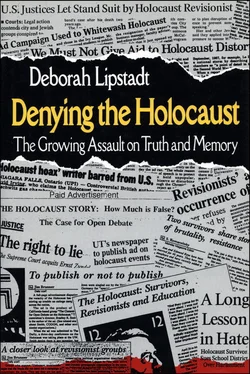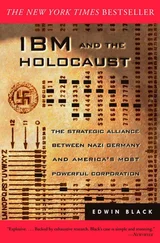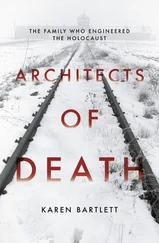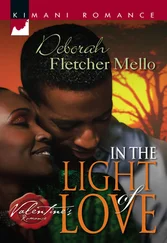The vast majority of intellectuals in the Western world have not fallen prey to these falsehoods. But some have succumbed in another fashion, supporting Holocaust denial in the name of free speech, free inquiry, or intellectual freedom. An absolutist commitment to the liberal idea of dialogue may cause its proponents to fail to recognize that there is a significant difference between reasoned dialogue and anti-intellectual pseudoscientific arguments. They have failed to make the critical distinction between a conclusion, however outrageous it may be, that has been reached through reasonable inquiry and the use of standards of evidence, on the one hand, and ideological extremism that rejects anything that contradicts its preset conclusions, on the other. Thomas Jefferson long ago argued that in a setting committed to the pursuit of truth all ideas and opinions must be tolerated. But he added a caveat that is particularly applicable to this investigation: Reason must be left free to combat error. {84} One of the ways of combating errors is by making the distinctions between scholarship and myth. In the case of Holocaust denial, we are dealing with people who consciously confuse these categories. As a result reason becomes hostage to a particularly odious ideology.
Reasoned dialogue, particularly as it applies to the understanding of history, is rooted in the notion that there exists a historical reality that—though it may be subjected by the historian to a multiplicity of interpretations—is ultimately found and not made. {85} The historian does not create, the historian uncovers. The validity of a historical interpretation is determined by how well it accounts for the facts. Though the historian’s role is to act as a neutral observer trying to follow the facts, there is increasing recognition that the historian brings to this enterprise his or her own values and biases. Consequently there is no such thing as value-free history. However, even the historian with a particular bias is dramatically different from the proponents of these pseudoreasoned ideologies. The latter freely shape or create information to buttress their convictions and reject as implausible any evidence that counters them. They use the language of scientific inquiry, but theirs is a purely ideological enterprise.
This absolutist commitment to free inquiry and the power of irrational mythical thinking at least partially explain how the deniers have managed to find defenders among various establishment figures and institutions. Even the supposed protectors of Western liberal ideals of reasoned dialogue can fall prey to the absolutist notion that all arguments are equally legitimate arenas of debate. By arguing that the deniers’ views, however ugly, must be given a fair hearing, they take a positive Western value to an extremist end. They fail to recognize that the deniers’ contentions are a composite of claims founded on racism, extremism, and virulent antisemitism. The issue is not interpretation: The challenge presented by the deniers is whether disinformation should be granted the same status and intellectual privileges as real history.
I reiterate that I am not advocating the muzzling of the deniers. They have the right to free speech, however abhorrent. However, they are using that right not as a shield, as it was intended by the Constitution, but as a sword. There is a qualitative difference between barring someone’s right to speech and providing him or her with a platform from which to deliver a message. Quick to exploit this situation, the deniers have engaged in a calculated manipulation of two principles dear to Americans: free speech and the search for historical truth.
In the pages that follow I shall examine both the modus operandi of Holocaust denial and the impact it has had on contemporary culture. I undertake this task with some hesitation, since readers might wonder how marginal the deniers can be if historians do not simply dismiss them. Does scholars’ attention suggest that they are not merely falsifiers? Does research on them give them the publicity they crave? [7]Indeed, deniers are quick to pounce joyfully on any discussion of their work as evidence of the serious consideration their views are receiving. In 1981 President Reagan, speaking at the official commemoration of the Days of Remembrance of the Holocaust, related how “horrified” he was to learn that there were people who claimed that the Holocaust was an invention. In its newsletter the Institute for Historical Review, the leading disseminator of Holocaust denial material, cited the president’s comments to demonstrate Holocaust denial’s “vibrancy” and “just how far Revisionism has come since our founding” {86} —a response reminiscent of the witticism: I don’t care what they say about me as long as they say something.
The deniers understand how to gain respectability for outrageous and absolutely false ideas. The anthropologist Marshall Sahlins has described how this process operates in the academic arena. Professor X publishes a theory despite the fact that reams of documented information contradict his conclusions. In the “highest moral tones” he expresses his disregard for all evidence that sheds doubt on his findings. He engages in ad hominem attacks on those who have authored the critical works in this field and on the people silly enough to believe them. The scholars who have come under attack by this professor are provoked to respond. Before long he has become “the controversial Prof. X” and his theory is discussed seriously by nonprofessionals, that is, journalists. He soon becomes a familiar figure on television and radio, where he “explains” his ideas to interviewers who cannot challenge him or demonstrate the fallaciousness of his argument. {87}
While we not have yet descended to the point at which respectful reviews of denial literature appear in Time, Newsweek, or The New Yorker, virtually all else has evolved as Sahlins described. Normal and accepted standards of scholarship, including the proper use of evidence, are discarded. What remains, in the word of this eminent anthropologist, is a “scandal.”
The danger that my research might inadvertently give the deniers a certain stature is not my only cause for trepidation. Another more serious problem is inherent in the process of refuting the deniers. It is possible, as the French historian Pierre Vidal-Naquet has observed, that in the course of answering the deniers an “exterminationist” school will be created in opposition to the “revisionist” one. {88} Such was the case when radio and television producers wondered why I wouldn’t talk to the “other side.” Deniers have, in fact, already taken to calling those who do research on the Holocaust “exterminationists.”
Despite these dangers I have undertaken this work for a number of reasons. First, denial of an individual’s or a group’s persecution, degradation, and suffering is the ultimate cruelty—on some level worse than the persecution itself. Those who have not experienced the Holocaust or the sting of antisemitism may find it difficult to understand the vulnerability it endangers in the victim. So, too, those who have never experienced racism cannot fully grasp the pain and anger it causes. This book is, in part, an attempt to convey the pain the deniers inflict. In writing it I have often found myself angry with them despite the facts that they live in a strange mental wonderland and that neither they nor the nonsense they spread are worthy of my anger. Although we do not take their conclusions seriously, contradictory as it may sound, we must make their method the subject of study. We must do so not because of the inherent value of their ideas but because of the fragility of reason and society’s susceptibility to such farfetched notions. Many powerful movements have been founded by people living in similar irrational wonderlands, national socialism foremost among them.
Читать дальше












